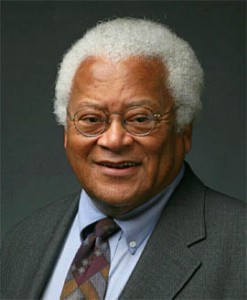Civil Rights Icon Transmits Peaceful Protest Philosophies to CSUN Students

James Lawson
Human rights luminaries such as Gandhi and Martin Luther King Jr. believed the greatest victories were achieved through nonviolent means. This sentiment is alive and well in the words and lessons of the Rev. James Lawson, King’s colleague and a significant figure of the American Civil Rights Movement.
This spring semester, Lawson returned to California State University, Northridge to share his knowledge of nonviolent activism with students in his Nonviolent Struggles, Civil Rights and Activism class. This is the seventh year Lawson has taught the course at CSUN, which is offered as a 400-level communication studies class and is sponsored by the university’s Civil Discourse & Social Change Initiative.
Lawson said the class focuses on the roots of nonviolent struggles and aims to provide students with lessons that will guide them in their pursuit of change and reform.
“I try to introduce [students] to the origins of 20th century nonviolence, largely through Gandhi, and in the West by [Martin Luther King Jr.]. I try to show nonviolence as a science of social change,” Lawson said. “You cannot replace violence with more violence. You cannot replace sexism with an imitation of sexism. Only through peace can you replace violence, sexism and racism.”
The class addresses current issues stemming from war, acts of violence and human rights violations. The course also highlights the effects of lingering racism and economic disparities, including socioeconomic inequality in the U.S.
“When you receive hateful treatment, you’re bleeding on the inside, which is itself a form of bloodshed that isn’t reported,” Lawson said. “And when you rob people of their livelihoods and wages, according to [the Hebrew Bible], that’s called murder — a bloodless murder.”
Lawson’s class ties into the current U.S. social climate, which has seen widespread, large-scale protests across major cities in response to the 2016 presidential election and major changes in U.S. policies and practices. Some CSUN students have responded to these changes by organizing nonviolent protests on campus.
However, Lawson cited recent demonstrations that began peaceful but turned chaotic — including the February protest at the University of California, Berkeley campus — as examples of how violence can undermine social justice. In the Berkeley incident, demonstrators gathered to protest a planned appearance by conservative journalist Milo Yiannopoulos. Around 150 masked individuals reportedly joined the rally and vandalized cars and university property, leading to at least six injuries and $100,000 in damages, according to CNN.
“There’s a problem with activism because some people are convinced that little bits and pieces of violence help the struggle, but I say they are wrong,” said Lawson, noting that Berkeley-style outbreaks during protests tend to divert media attention from peaceful activists’ efforts.
Kathryn Sorrells, chair of CSUN’s Department of Communication Studies, met Lawson after CSUN students and faculty marched in protest of tuition increases in March 2010. Sorrells said police intervened in the demonstration, arrested several students and injured a faculty member.
Following the arrests, Sorrells and her colleague, Marta Lopez-Garza, sought ways to educate CSUN students, faculty and the community on nonviolent approaches to social change. She and professor Lopez-Garza met Lawson at an event at Holman Methodist Church, where he served as pastor until his retirement in 1999.
“We went to an event [at Holman], and we knew we had to have him come and teach on campus. We worked with Provost Hellenbrand and he agreed to support the initial visiting scholar position in fall 2010,” she said. “This is the seventh year [Lawson] has been affiliated with CSUN, and we’re very fortunate to have him.”
CSUN presented Lawson with an honorary Doctor of Humane Letters at its 2016 commencement ceremony as a token of appreciation for his involvement with the university.
Lawson said, above all, he wants students to broaden their perspectives and combat hate with honor and humanity.
“I criticize the notion that there are only two sides in people and society,” Lawson said. “This idea suppresses conversation because people are multidimensional in how we live. So, conversations should be multidimensional. It’s not just liberal and conservative. Mistreatment of people is wrong — there’s no liberal or conservative side to it.
“There’s strength in the truth,” he continued. “There’s strength in what’s right, and in love. Truth and love are great unsung weapons for human beings to change their lives. Wars aren’t solving anybody’s problems.”

 experience
experience